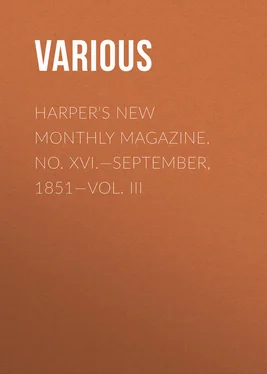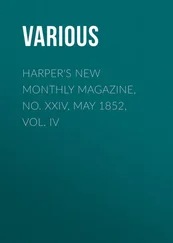Various - Harper's New Monthly Magazine. No. XVI.—September, 1851—Vol. III
Здесь есть возможность читать онлайн «Various - Harper's New Monthly Magazine. No. XVI.—September, 1851—Vol. III» — ознакомительный отрывок электронной книги совершенно бесплатно, а после прочтения отрывка купить полную версию. В некоторых случаях можно слушать аудио, скачать через торрент в формате fb2 и присутствует краткое содержание. Издательство: Иностранный паблик, Жанр: periodic, foreign_edu, на английском языке. Описание произведения, (предисловие) а так же отзывы посетителей доступны на портале библиотеки ЛибКат.
- Название:Harper's New Monthly Magazine. No. XVI.—September, 1851—Vol. III
- Автор:
- Издательство:Иностранный паблик
- Жанр:
- Год:неизвестен
- ISBN:нет данных
- Рейтинг книги:3 / 5. Голосов: 1
-
Избранное:Добавить в избранное
- Отзывы:
-
Ваша оценка:
- 60
- 1
- 2
- 3
- 4
- 5
Harper's New Monthly Magazine. No. XVI.—September, 1851—Vol. III: краткое содержание, описание и аннотация
Предлагаем к чтению аннотацию, описание, краткое содержание или предисловие (зависит от того, что написал сам автор книги «Harper's New Monthly Magazine. No. XVI.—September, 1851—Vol. III»). Если вы не нашли необходимую информацию о книге — напишите в комментариях, мы постараемся отыскать её.
Harper's New Monthly Magazine. No. XVI.—September, 1851—Vol. III — читать онлайн ознакомительный отрывок
Ниже представлен текст книги, разбитый по страницам. Система сохранения места последней прочитанной страницы, позволяет с удобством читать онлайн бесплатно книгу «Harper's New Monthly Magazine. No. XVI.—September, 1851—Vol. III», без необходимости каждый раз заново искать на чём Вы остановились. Поставьте закладку, и сможете в любой момент перейти на страницу, на которой закончили чтение.
Интервал:
Закладка:
"Two of my comrades in the military school, and the two to whom I was most closely united by the sympathies of early friendship, had, by one of those mysteries of Providence which we often witness, an immense influence upon my destiny. Démasis arrested me at the moment when I was about to commit suicide; and Philippeau prevented my conquest of St. Jean d'Acre. Had it not been for him I should have been master of this key of the East. I should have marched upon Constantinople, and have established an empire in Asia."
But reverses began now to attend the army in Italy. Defeat followed defeat. They were driven by the Austrians from the posts to which Napoleon had conducted them, and were retreating before their foes. The Committee of Public Safety were in great trepidation. In their ignorance they knew not what orders to issue. Some one who had heard of Napoleon's achievements among the Alps suggested his name. He was called into the meetings of the committee for advice. The local and technical information he had acquired, his military science, and the vast resources of his highly cultivated mind, placed him immediately at the head of the committee. Though young in years, and still more youthful in appearance, his gravity, his serious and pensive thoughtfulness, gave oracular weight to his counsels, and his plans were unhesitatingly adopted. He had studied the topography of the Maritime Alps with the most enthusiastic assiduity, and was familiar with the windings and characteristics of every stream, and the course of mountain ranges, and with the military capabilities of the ravines and glens. The judicious dispositions which he proposed of the various divisions of the army arrested the tide of Austrian conquest, and enabled the French, though much inferior in number to their allied foes, to defend the positions they had been directed to occupy. During all this time, however, while Napoleon, in the committee-room in Paris, was guiding the movements of the army in Italy, he was studying in the public libraries, during every leisure moment, with an assiduity so intense and inexhaustible that it could not have been surpassed had he been inspired with the highest ambition for literary and scientific honors.
In his occasional evening saunterings along the boulevards, as he saw the effeminate young men of that metropolis, rolling in luxury, and, in affected speech, criticising the tones of an opera singer, or the exquisite moulding of a dancer's limbs, he could not refrain from giving utterance to his contempt. When he was thus one evening treading the dusty thoroughfares and looking upon such a spectacle, he impatiently exclaimed, "Can it be, that upon such creatures fortune is willing to lavish her favors! How contemptible is human nature." Though Napoleon secluded himself entirely from haunts of revelry and scenes of dissipation, and from all those dissolute courses into which the young men of those days so recklessly plunged, he adopted this course, not apparently from any conscientious desire to do that which was right in the sight of God, but from what has been called "the expulsive power of new affection." Ambition seemed to expel from his mind every other passion. The craving to obtain renown by the performance of great and glorious deeds; the desire to immortalize his name, as one of the distinguished men and illustrious benefactors of the human race, had infused itself so intensely throughout his whole nature, that animal passion even was repressed, and all the ordinary pursuits of worldly pleasure became in his view frivolous and contemptible. His ambition needed but the spirit of religion to sanctify it, to make it as noble an ambition as ever glowed in a human bosom. But alas! it all centred in himself. He wished to benefit the human race, not because he loved his fellow man, but that he might immortalize his own name.
At this time it can hardly be said that there was any religion in France. Christianity had been all but universally discarded. The priests had been banished; the churches demolished or converted into temples of science or haunts of merriment; the immortality of the soul was denied, and upon the gateways of the grave-yards there was inscribed, "Death is an eternal sleep." Napoleon was consequently deprived of all the influences of religion in the formation of his character. And yet his mind was naturally, if it be proper so to speak, a devotional mind. His temperament was serious, thoughtful, and pensive. The grand and the mysterious engrossed and overawed him. Even his ambition was not exulting and exhilarating, but sombre, majestic, and sublime. He thought of Herculean toil and sleepless labor, and heroic deeds. For ease, and luxury, and self-indulgence, he had no desire, but he wished to be the greatest of men by accomplishing more than any other mortal had ever accomplished. Even in youth life had but few charms for him, and he took a melancholy view of man's earthly pilgrimage, after asserting that existence was not a blessing. And when drawing near to the close of life he asserted that he had known but few happy moments upon earth, and that for those few he was indebted to the love of Josephine.
The National Convention now prepared another constitution for the adoption of the people of France. The executive power, instead of being placed in the hands of one king, or president, was intrusted to five chiefs, who were to be called Directors. The legislative powers were committed to two bodies, as in the United States. The first, corresponding to the United States Senate, was to be called the Council of Ancients . It was to consist of two hundred and fifty members, each of whom was to be at least forty years of age, and a married man or a widower. An unmarried man was not considered worthy of a post of such responsibility in the service of the state. The second body was called the Council of Five Hundred , from the number of members of which it was to be composed. It corresponded with our House of Representatives, and each of its members was to be at least thirty years of age.
This constitution was far superior to any other which had yet been formed. It was framed by the moderate republicans, who wished to establish a republican government, protecting France on the one hand from the royalists, who would reestablish the Bourbons upon the throne, and on the other hand from the misrule of the violent Jacobins, who wished to perpetuate the reign of terror. This constitution was sent down to the primary assemblies of the people, for their adoption or rejection. It was accepted promptly in nearly all the rural districts, and was adopted by acclamation in the army.
The city of Paris was divided into ninety-six sections, or wards, in each of which, as in our cities, the inhabitants of that particular ward assembled at the polls. When the constitution was tendered to these several sections of Paris, forty-eight of them voted in its favor, while forty-six rejected it. The royalists and the Jacobins, the two extremes, united in the opposition, each party hoping that by the overthrow of the Convention their own views might obtain the precedence. The Convention declared that the majority of the nation had every where pronounced in favor of the new constitution, and they prepared to carry its provisions into effect. The opposing sections, now thoroughly aroused, began to arm, resolved upon violent resistance. The Parisian mob, ever ready for an outbreak, joined most heartily with their more aristocratic leaders, and all Paris seemed to be rousing to attack the Convention. The National Guard, a body of soldiers corresponding with the American militia, though far better officered, equipped, and drilled, joined promptly the insurgents. The insurrection-gun was fired, the tocsin tolled, and the gloomy, threatening masses, marshaled under able leaders, swarmed through the streets. The Convention was in the utmost state of trepidation; for in those days of anarchy, blood flowed like water, and life had no sacredness. It was not a mob of a few hundred straggling men and boys who were to surround their hall with hootings and to break their windows; but a formidable army of forty thousand men, in battle array, with artillery and musketry, headed by veteran generals, who had fought the battles of the old monarchy, with gleaming banners and trumpet tones, were marching down from all quarters of the city, upon the Tuileries. To meet this foe the Convention had at its command but five thousand regular troops; and it was uncertain but that they, in the moment of peril, might fraternize with the insurgents. General Menou was appointed, by the Convention, to quell the insurrection. He marched to meet the enemy. Napoleon, intensely interested in the passing scenes, followed the solid columns of Menou. But the general, a mild and inefficient man, with no nerve to meet such a crisis, was alarmed in view of the numbers and the influence of his antagonists, and retired before them. Shouts of victory resounded from the National Guard, through all the streets of Paris. They were greatly emboldened by this triumph, and felt confident that the regular troops would not dare to fire upon the citizens. The shades of night were now settling down over the agitated city. Napoleon having witnessed the unsuccessful mission of Menou, ran through the streets to the Tuileries, and ascending the gallery where the Convention was assembled, contemplated, with a marble brow and a heart apparently unagitated, the scene of consternation there. It was now eleven o'clock at night, and the doom of the Convention seemed sealed. In the utmost alarm Menou was dismissed, and the unlimited command of the troops intrusted to Barras. The office was full of peril. Successful resistance seemed impossible, and unsuccessful was certain death. Barras hesitated, when suddenly he recollected Napoleon, whom he had known at Toulon, and whose military science and energy, and reckless disregard of his own life, and of the lives of all others, he well remembered. He immediately exclaimed, "I know the man who can defend us, if any one can. It is a young Corsican officer, Napoleon Bonaparte, whose military abilities I witnessed at Toulon. He is a man who will not stand upon ceremony." Napoleon was in the gallery at the time, and it is not impossible that the eye of Barras chancing to light upon him, caused the suggestion.
Читать дальшеИнтервал:
Закладка:
Похожие книги на «Harper's New Monthly Magazine. No. XVI.—September, 1851—Vol. III»
Представляем Вашему вниманию похожие книги на «Harper's New Monthly Magazine. No. XVI.—September, 1851—Vol. III» списком для выбора. Мы отобрали схожую по названию и смыслу литературу в надежде предоставить читателям больше вариантов отыскать новые, интересные, ещё непрочитанные произведения.
Обсуждение, отзывы о книге «Harper's New Monthly Magazine. No. XVI.—September, 1851—Vol. III» и просто собственные мнения читателей. Оставьте ваши комментарии, напишите, что Вы думаете о произведении, его смысле или главных героях. Укажите что конкретно понравилось, а что нет, и почему Вы так считаете.












